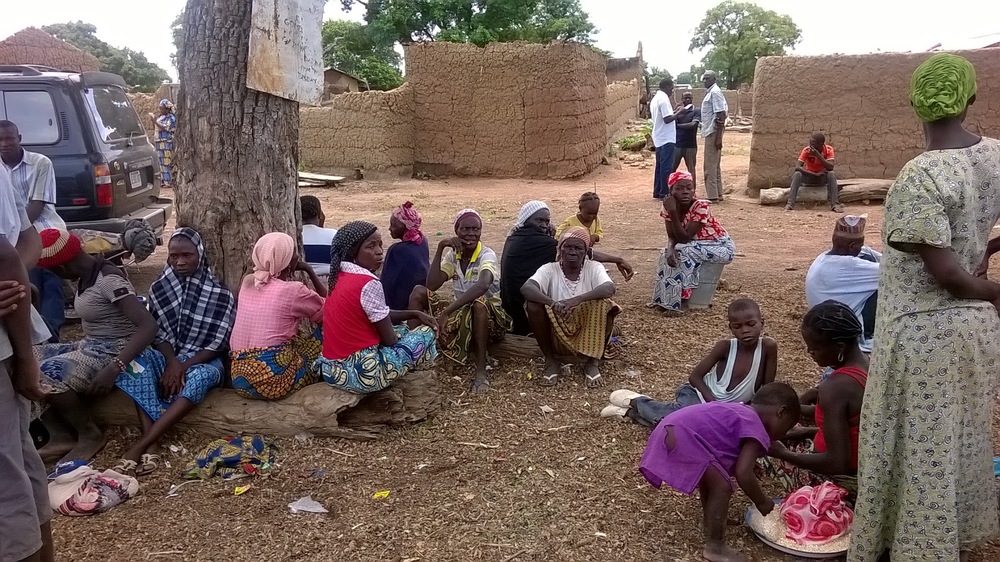
Since 2009, many people from areas in northeast Nigeria have suffered terrible consequencesfrom brutal attacks by insurgents. Whole families have had to leave their livelihoods and their ancestral homes, leading to the mass displacement of whole villages and communities. The states most heavily affected by the unrest are Adamawa, Yobe and Borno. As a result of this situation, in November of 2012 the Government of Nigeria (GoN) declared a state of emergency in those states.
With the recapturing of some of these territories by the military and other security forces, some Internally Displaced Persons (IDPs) have started returning to their homes and communities. Insurgency is still a problem, but Adamawa State has so far recorded the highest number of returnees, due to significant security improvements.
Once IDPs began returning home, they faced huge challenges to resume normal life. Insurgents often burn down houses and destroy long established schools and health centers, which can be traumatic for the returnees.
A comprehensive needs assessment was undertaken by the GoN to find out the experiences of the IDPs, measure community needs, and to work out required levels of humanitarian assistance to the IDPs in camps and host communities. eHA saw opportunities to partner with the GoN and other humanitarian organizations to provide assistance to IDPs in three thematic areas: WASH, Health, and Nutrition.
NEMA, on behalf of the GoN and the Humanitarian Country Team conducted a joint rapid assessment in areas where IDPs were returning home within Adamawa State from July 1-10, 2015. The assessment determined humanitarian needs within returning populations: the availability of food, livelihood opportunities, health, education, water, sanitation, hygiene, food security, nutrition, protection, shelter and NFIs. Once these needs were measured, the assessment identified gaps in the services and relief being provided.
The Assessment Process
The assessment used Key Informant Interviews (KIIs), by bringing experts from the mainthematic areas of the mission to the field. The KI’s provided questions for the communities on their area of competence. For example a nurse working in a health facility led on the nutrition and health questions, while a principal or school teacher led on education. KIIs were facility based, and GPS records of the site were taken. eHA preloaded assessment questions onto smartphones which were directly inputted . At the conclusion of each interview, assessment data was uploaded in near real-time for faster processing.
Focus Group Discussions (FGDs) took place using a cross-section of the community, namely LGA and community leaders, women, men, and youths. FGD questions were embedded in the assessment protocol which had been circulated earlier to the assessment teams.
The assessment found that many of the IDP’s on their return had experienced issues with extortion by security operatives at checkpoints, further attacks by insurgents, had limited access to construction materials, and lack of clean water. They couldn’t find jobs, there was often no schools close by they could send their children to, and they did not have enough of a balanced diet.
eHA's Recommendations
- Provide urgent food assistance, livelihoods support and capacity building in the form of agricultural supports through provision of farm inputs and seeds for planting.
- Support for shelter and NFIs to assist households in rebuilding their homes using available local resources within the communities.
- Advocacy for improved security in the affected areas.
- Provision of medical services and commodities construction and rehabilitation of boreholes
- Provision and advocacy of personal hygiene materials
- Education facilities are overstretched in peaceful areas. More functioning and accessible schools need to be built and teaching and learning materials need to be provided.
At the end of the 10 day assessment, seven Local Government Areas (LGAs) in Adamawa state were covered: Maiha, Gombi, Mubi North, Mubi South, Hong, Michika, and Madagali. Within those seven LGAs, approximately thirty communities in the seven LGAs were reached.
eHA was honored to work on such a vital and important mission to improve isolated peoples’ lives, and is now exploring other opportunities to partner with the GoN and help bring back normal life to people in the northern region of Nigeria.
